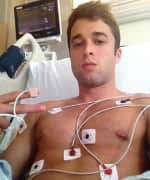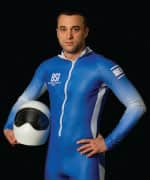Life Extension Magazine®
When the left side of 23-year-old Jared Firestone’s body started going numb, he knew something was terribly wrong.
But he had no idea he was having a stroke.
In his first year of law school at Benjamin N. Cardozo School of Law in New York City, and following a successful college career as a track and field athlete, Firestone thought he was in perfect health.
In reality, a silent, hidden threat had been lurking in his body his entire life.
The day that Firestone suffered his stroke —October 3, 2013—marked a turning point, setting him on a path that would change his life forever.
The Day That Changed Everything

Firestone’s symptoms started gradually. First, he noticed that his fingers wouldn’t bend when he tried to turn off his morning alarm. He shrugged it off, thinking his hand had just “fallen asleep.” But by the time he attempted to brush his teeth, he couldn’t use his right arm.
“That’s when I sensed something was really wrong,” said Firestone.
By the time he called his father, a doctor, he couldn’t even form the words to clearly tell him what was happening. But his father had a feeling he might be having a stroke, and told him to get to the hospital right away.
“I thought I’d never be able to feel my body again,” said Firestone.
But he was one of the lucky ones.
Rather than having a “regular” stroke, which can lead to permanent disability, Firestone had suffered a mini stroke (also called a transient ischemic attack or TIA), which typically only produces temporary symptoms.
That’s because while a stroke is caused by a blockage of blood flow in the brain, in a mini-stroke, that blockage is only temporary, making the symptoms temporary as well.
By the next day, Firestone had regained feeling throughout his body.
Testing revealed that he likely had a tiny hole in his heart. The doctors explained that during one of his heartbeats, a blood clot went out of that hole and up to his brain, triggering his mini-stroke.
Since the hole was too small to fix, Firestone was sent home with instructions to take a baby aspirin daily and to avoid high-stress situations.
But Firestone didn’t simply ignore the advice about avoiding stress… he tossed it out the window. Because in the years that have followed, he began competing in one of the world’s most stressful, high-risk sports – all while completing his law degree.
Finding His Identity
“The stroke made me want to think outside the box,” said Firestone. “Being a lawyer is a great thing, but I felt like I wanted to do more.”
Firestone’s epiphany came a few months after his stroke, when he was watching the Winter Olympics on television, and he saw a sport called skeleton.
Skeleton is a sledding sport that involves a single person on a sled riding face-first down a winding track at speeds up to 80 miles per hour and under 5 G’s of pressure. There are no brakes or steering mechanisms on the sled, forcing the rider to steer with body movements alone.
One look at skeleton, and Firestone was hooked.
“I always loved sports, and I had competed in track in high school and in college. That was my identity,” said Firestone. “And after the stroke, I realized that was what I wanted to get back to.”
But what does a winter sledding sport have to do with running track? As Firestone learned, sprinting is the foundation of skeleton because getting a good time highly depends on the 50-meter sprint at the top of the chute. The speed of the sprint helps build momentum for a faster race down the track.
“You could be the best driver, but if you don’t have the speed at the start, you’re not going to win,” said Firestone.
Diving Head-First into Life

Firestone was invited to a sliding school in Lake Placid, N.Y., where he was literally thrown into the sport.
“There are 20 curves in the chute, and they start you at curve 9,” said Firestone. “They don’t give much instruction other than to not panic and to try to have fun.”
The only protections provided to the riders are ski goggles and an open-faced helmet.
“I took some pretty big hits that first week,” said Firestone. “I got my nose scraped up, but I was still smiling in the end. That’s when I knew this was something I wanted to do.”
While finishing law school, Firestone went on to compete in the regional and national skeleton races and came in 12th at the U.S. Nationals race in 2019.
But as Firestone sets his sights on the 2022 Winter Olympics, he won’t be competing for a spot on the U.S. team. He’ll be racing to represent another country: Israel.
After making a name for himself on the U.S. team, Firestone was approached by AJ Edelman, Israeli Olympic skeleton racer in the 2018 Winter Olympics, about racing for Israel.
It was an easy decision.
“I’ve always had a strong connection to the Jewish community. I went to Jewish day school growing up, and I’ve been to Israel numerous times. Being able to represent Israel was something that was important to me,” said Firestone.
After three years with the U.S. team, Firestone obtained his Israeli citizenship. Now, starting this October, he’ll be donning the signature Star of David from the Israeli flag.
Preparing to Be the Best
As Firestone looks to the 2022 Winter Olympics, he prepares his body with a balance of training and conditioning, rest, and supplementation.
“The sport is pretty demanding because it takes both a physical and mental toll on you,” said Firestone. “In addition to the physical beating you might take while sliding, you train like a sprint athlete at the same time.”
In the off season, Firestone focuses on workouts that build up strength and conditioning. During the competition season, he focuses on allowing his body to rest and recover from the races. He also incorporates specific supplements into his routine.
For example, because Firestone has problems with cramping, he takes hydration products with electrolytes. “These help me with my endurance, and give me the confidence that I won’t cramp,” he said.
Since he has a fast metabolism, he takes omegas-3, 6, and 9 in order to give him the energy he needs to get through his workouts.
In addition to a multivitamin, he also takes mushroom extract, glutamine, and bone broth protein – various supplements that he says help provide natural energy and help him focus.
A Deeper Message

While making it to the Olympics would be the biggest accomplishment of Firestone’s life, his message extends beyond his own personal goals.
Growing up, Firestone saw the 2005 movie, “Munich,” produced and directed by Steven Spielberg, which tells the tragic, real-life story of a Palestinian terrorist group that infiltrated the Olympic Village in West Germany in 1972 and murdered 11 members of the Israeli Olympic team.
“Being able to represent Israel on the world stage would bring me so much pride,” said Firestone. “To me it is extra special because of being able to make the statement that we’re not going away. Terrorism is not going to scare us.
“That belief resonates throughout sports, history, and life,” said Firestone. “Now that I’m representing Israel, spreading that message makes me more motivated than ever to do this.”
Sacrifices are Worth It
Following your dreams is never easy. It takes time, dedication, sacrifice, and as they say in Israel, chutzpah.
For Firestone, it has meant putting his law career on the back burner. The competition season lasts six months, and, as Firestone explains, no firm is willing to hire someone who is going to be away for half the year.
While the Israeli Skeleton Federation has been around for 16 years, they don’t have a lot of resources, which means the burden of the sport’s expenses – which run in excess of $30,000 per year – falls to Firestone.
“I knew when I made this choice to compete for Israel that I couldn’t have a life focused on my legal career, traveling, or hanging out with friends,” said Firestone. “There are sacrifices, but to me it’s worth it.”
Firestone works as a realtor and has started his own private law firm so that he can take on various legal work during his off season. He’s also actively looking for sponsors.
“Making it to the Olympics would be the ultimate accomplishment for myself,” said Firestone. “But on top of that, being able to bring joy and pride to my community here and around the U.S. and Israel makes all the hard work and sacrifice worth it.”
If you have any questions on the scientific content of this article, please call a Life Extension® Wellness Specialist at 1-866-864-3027.

